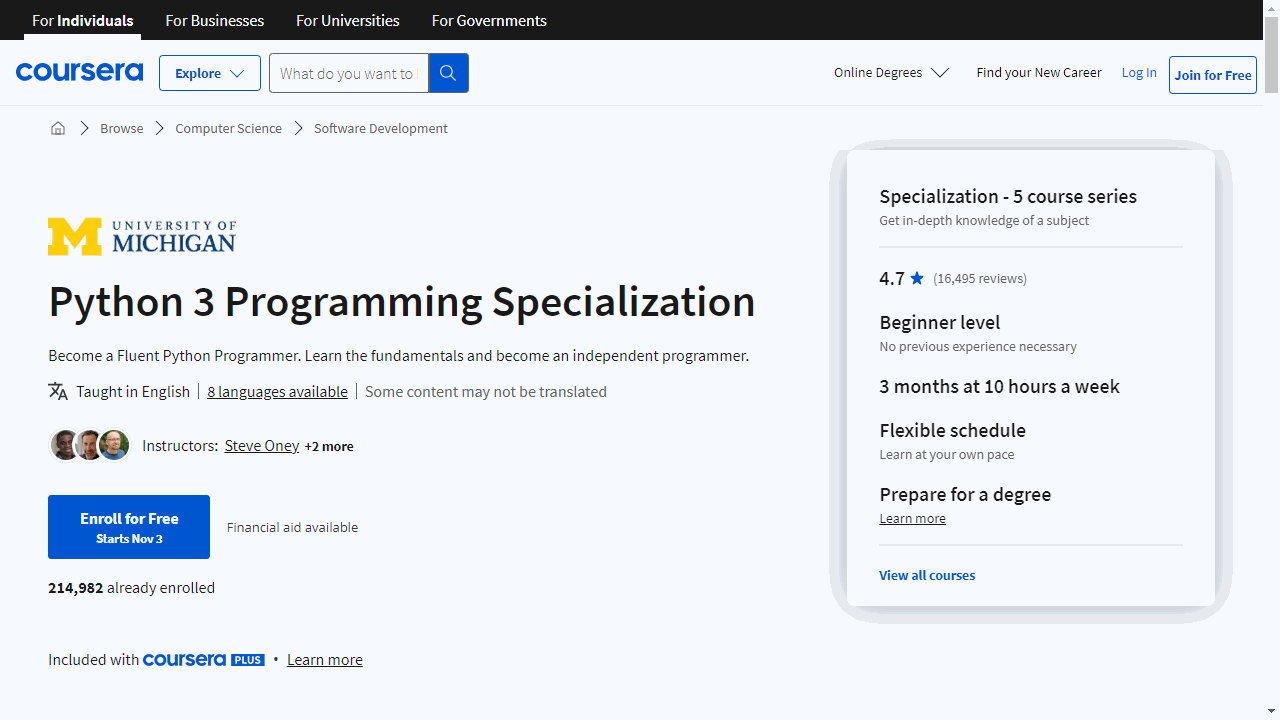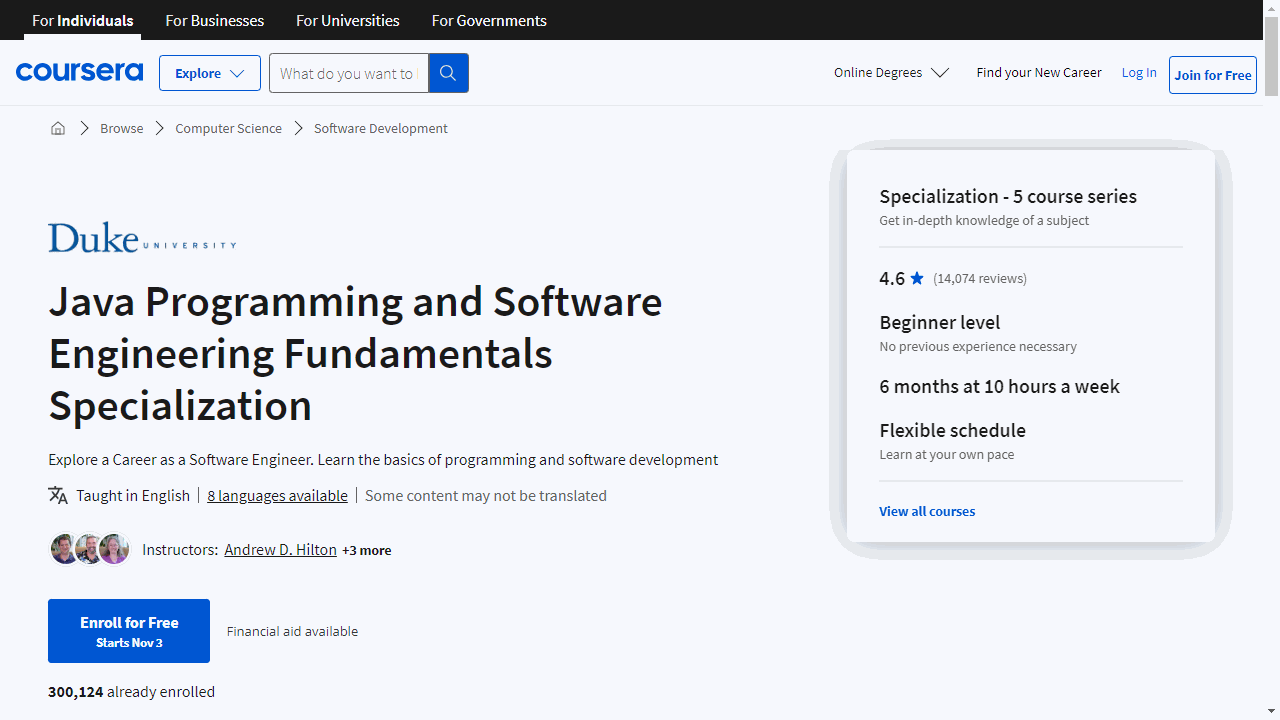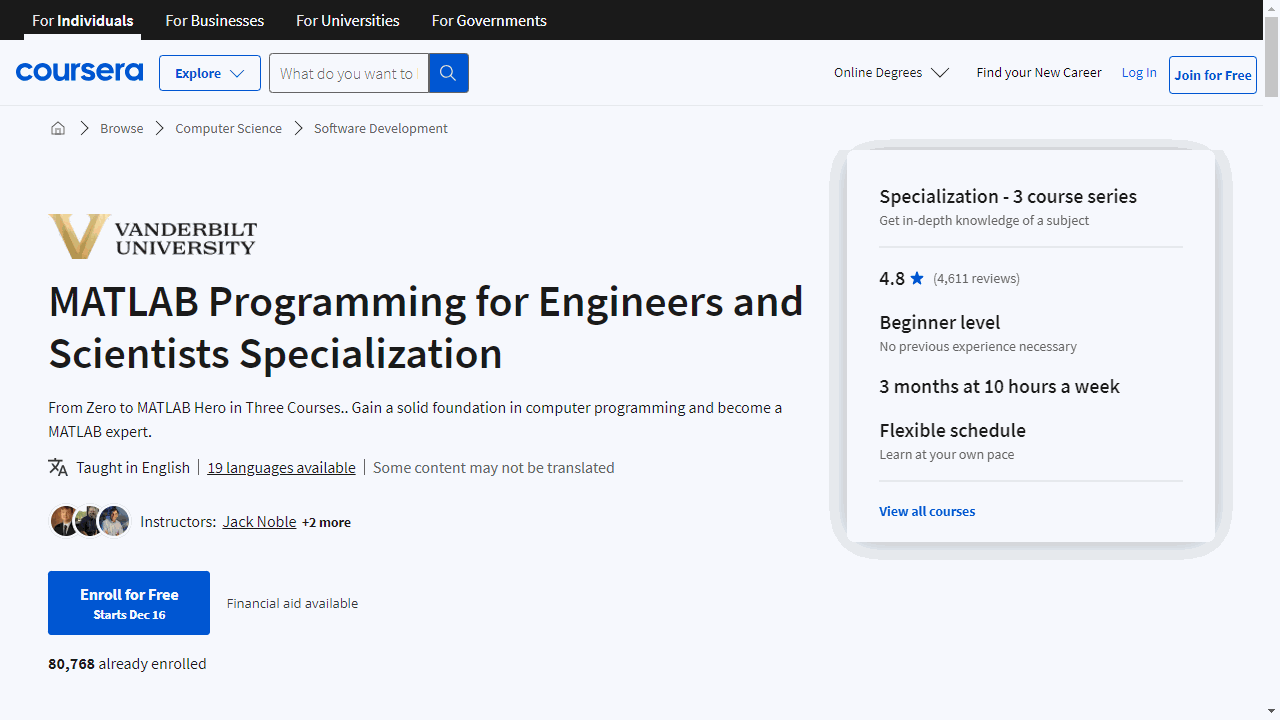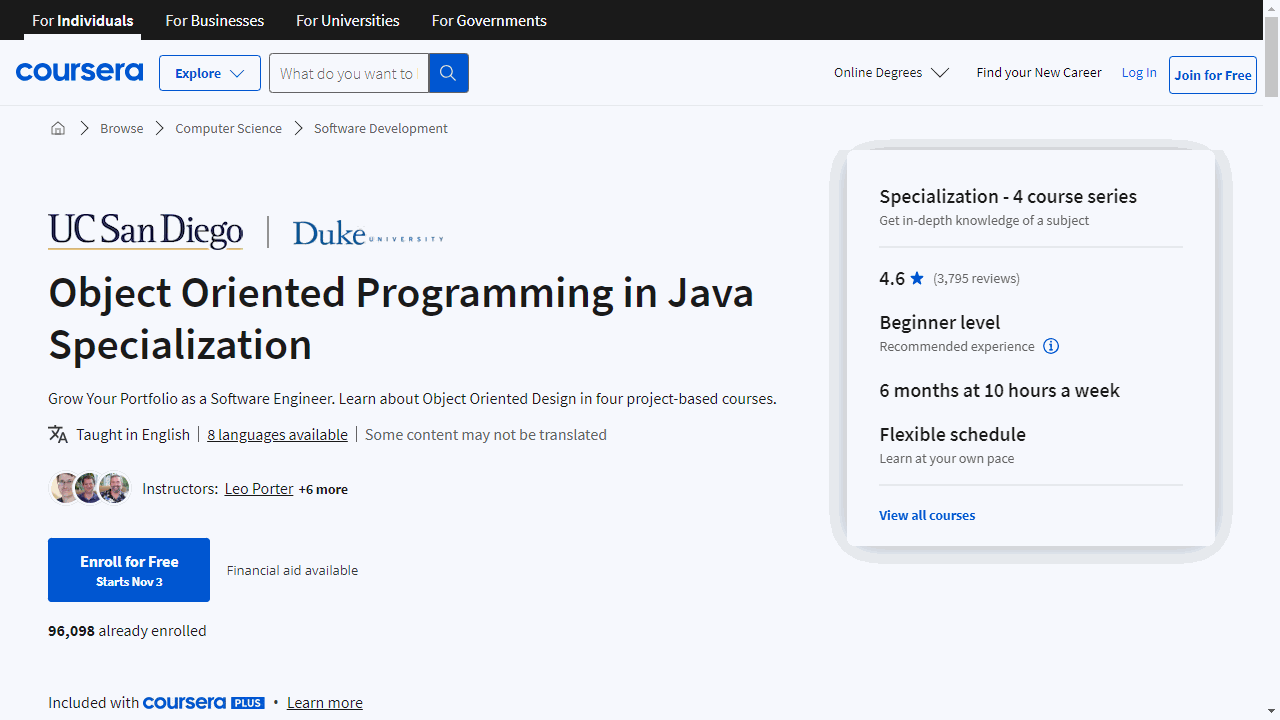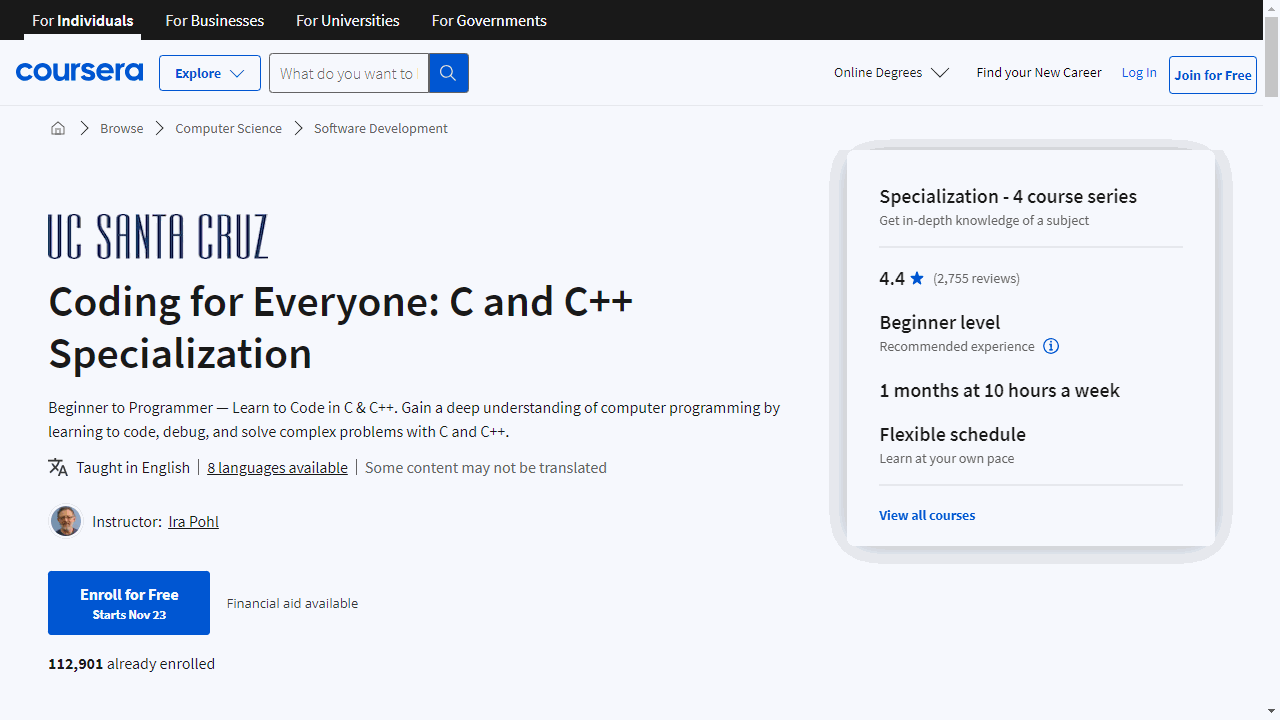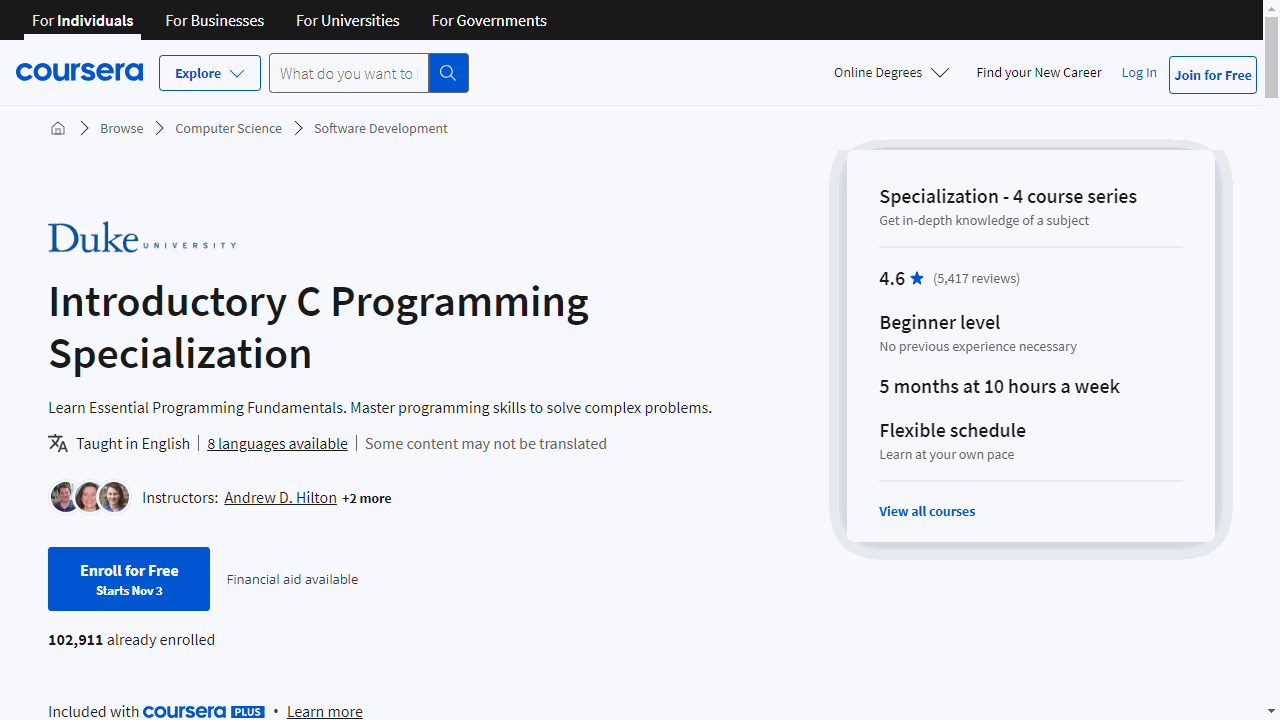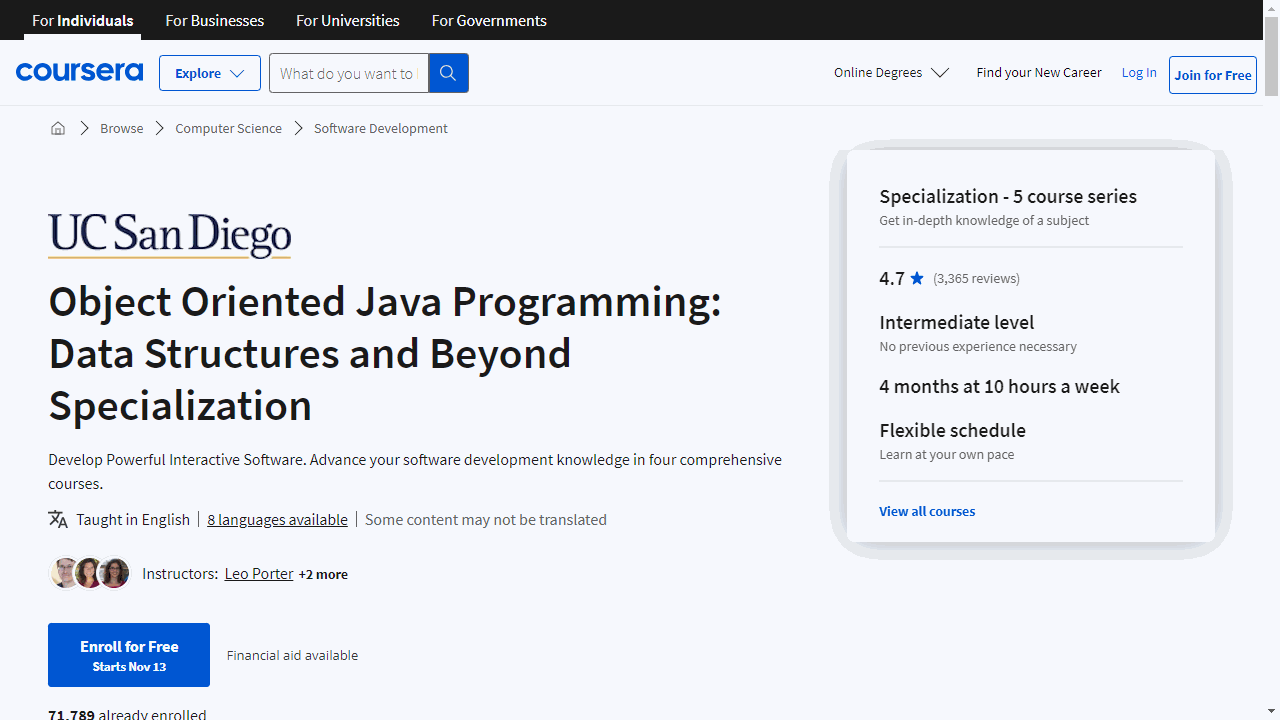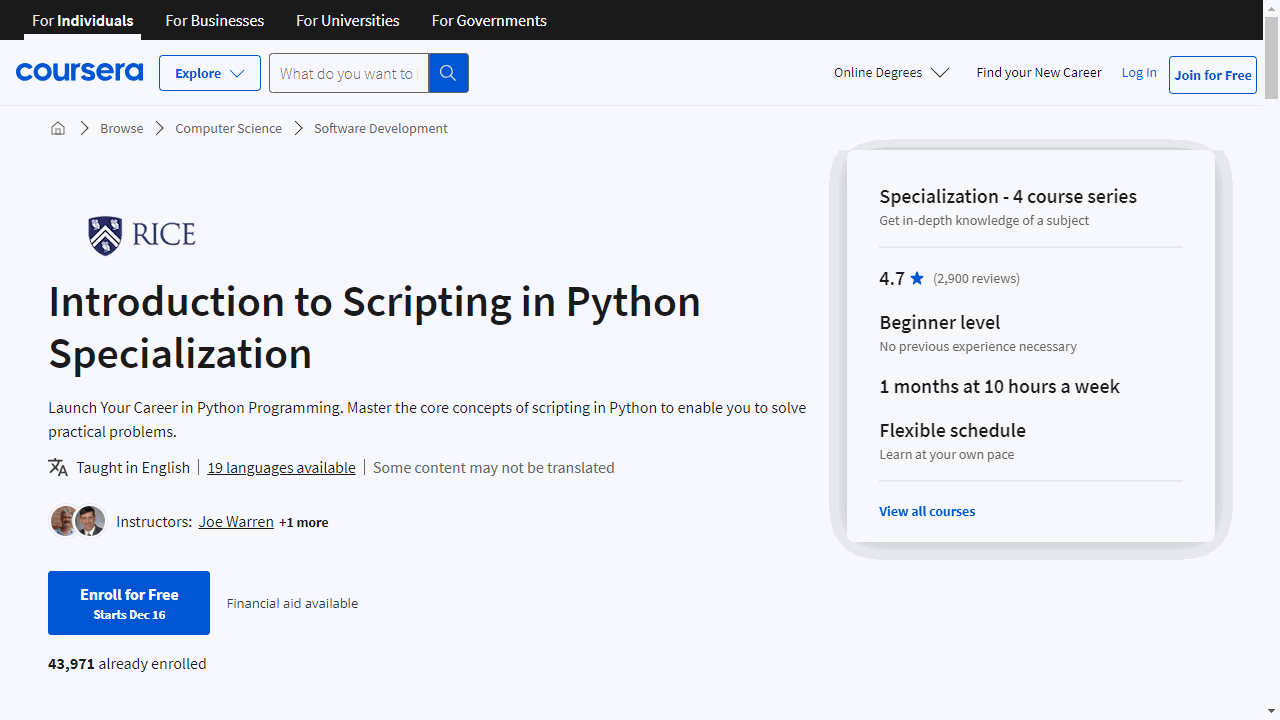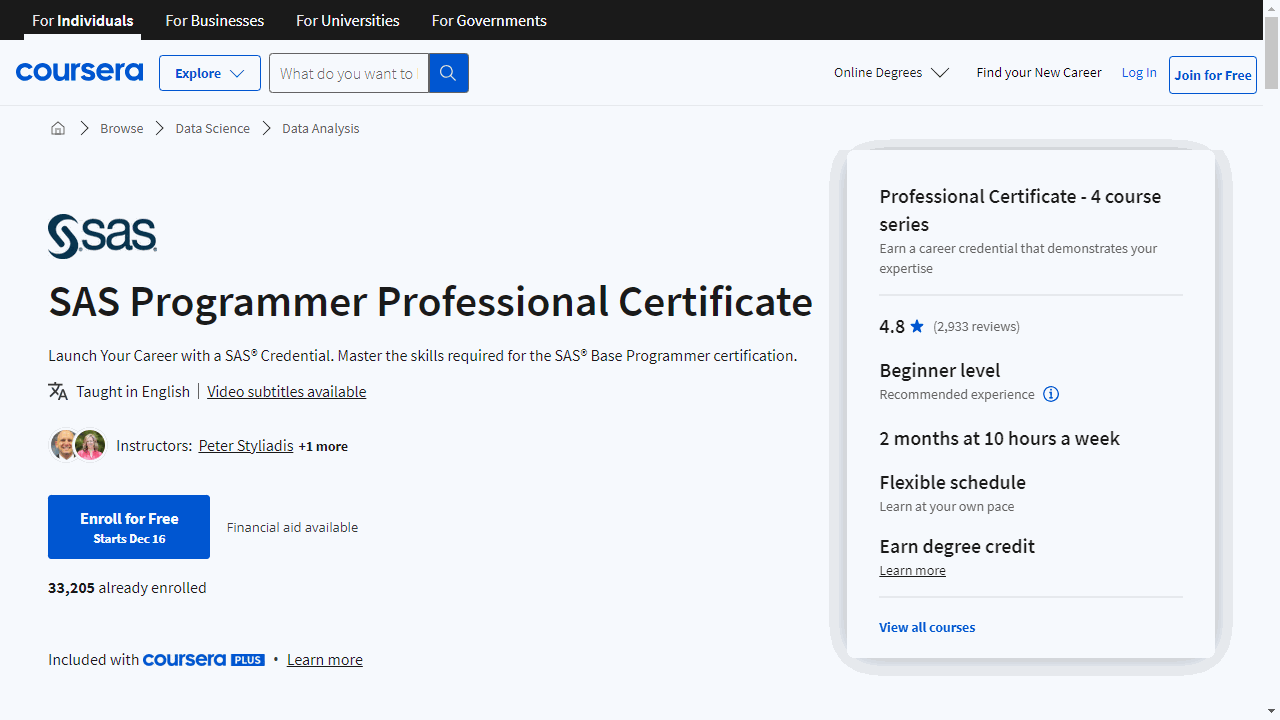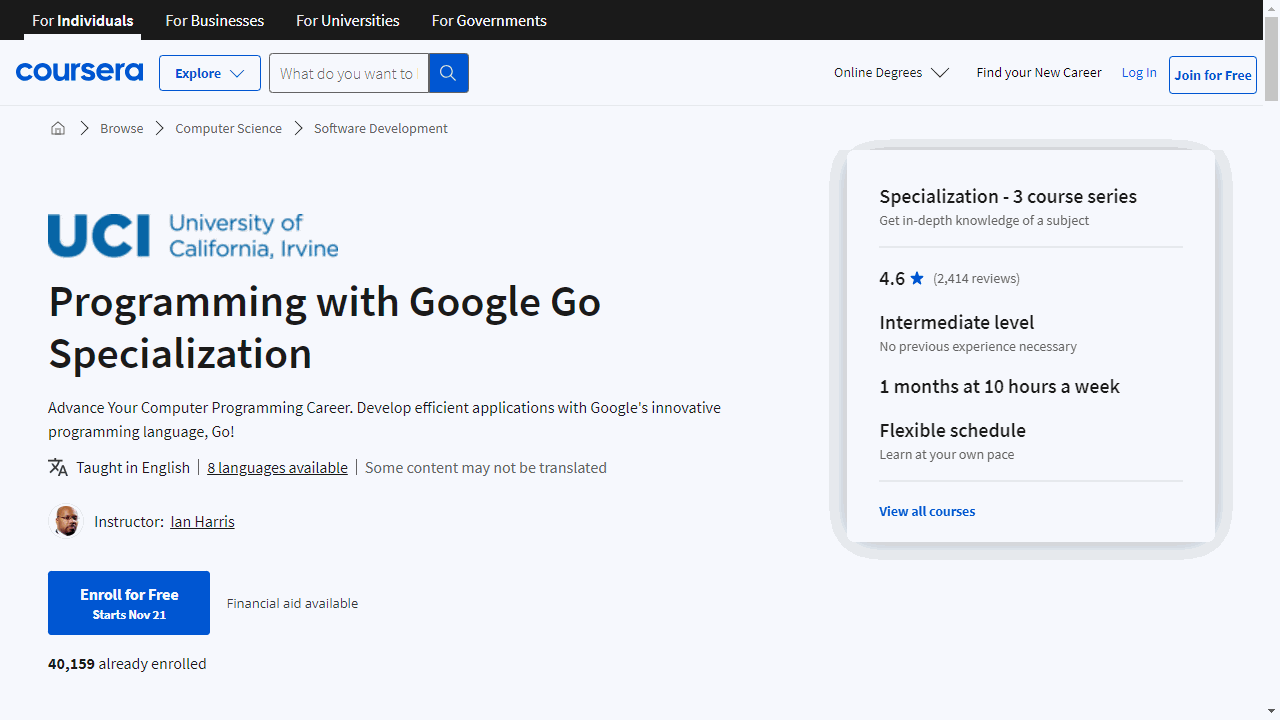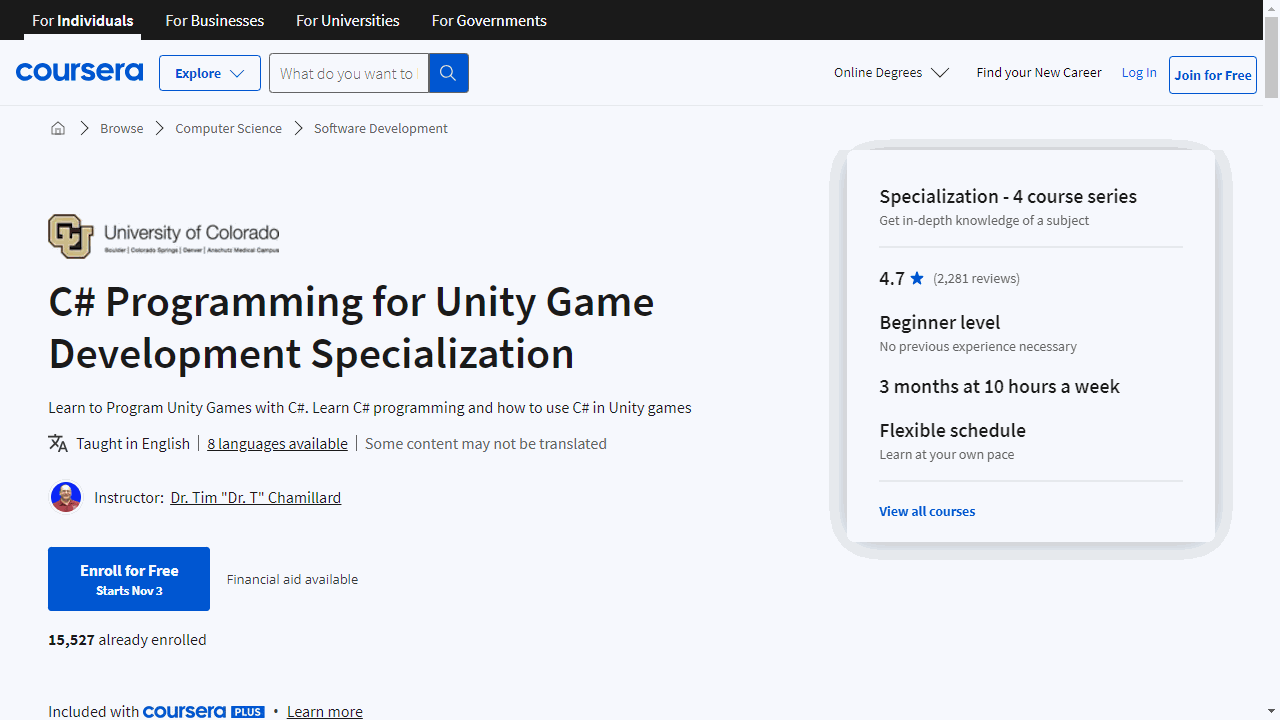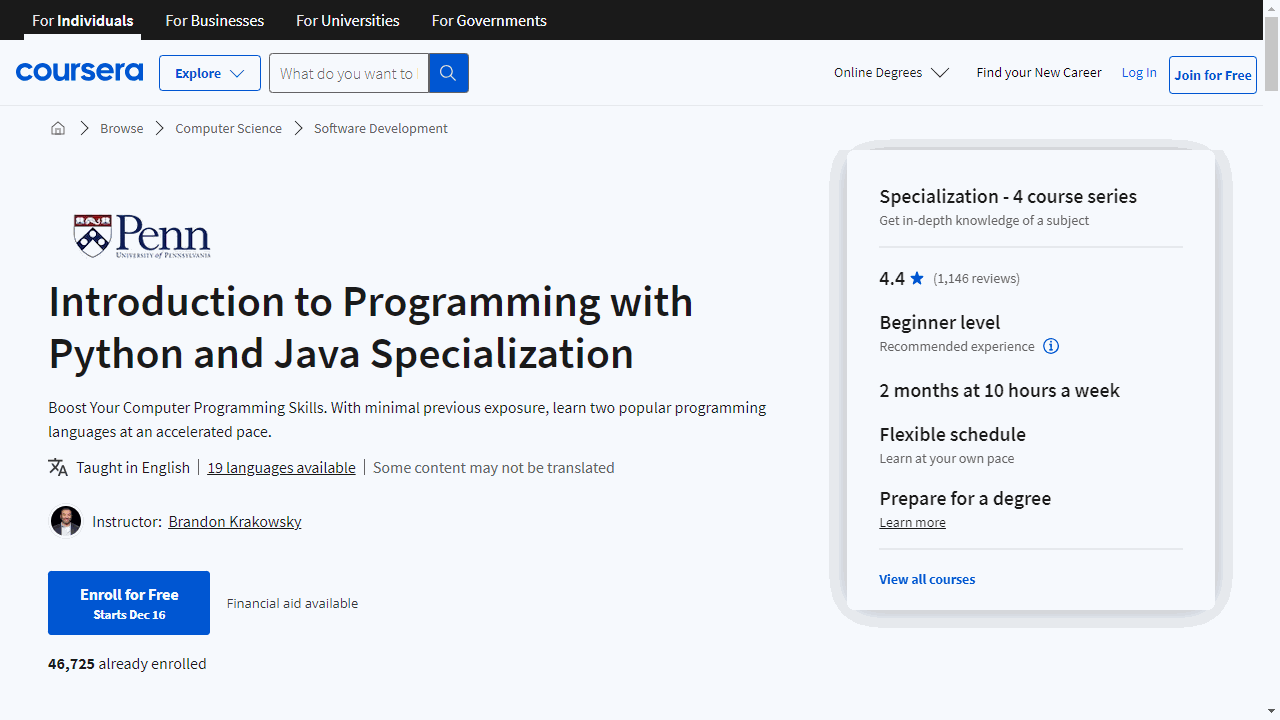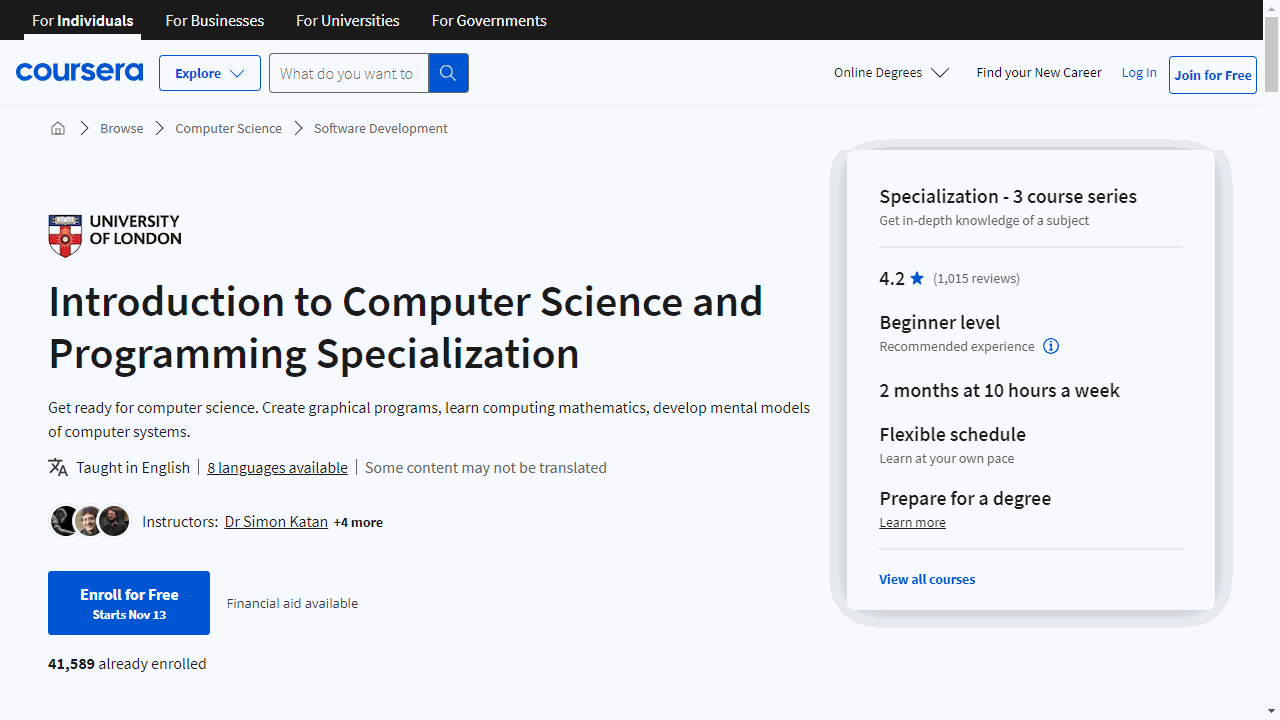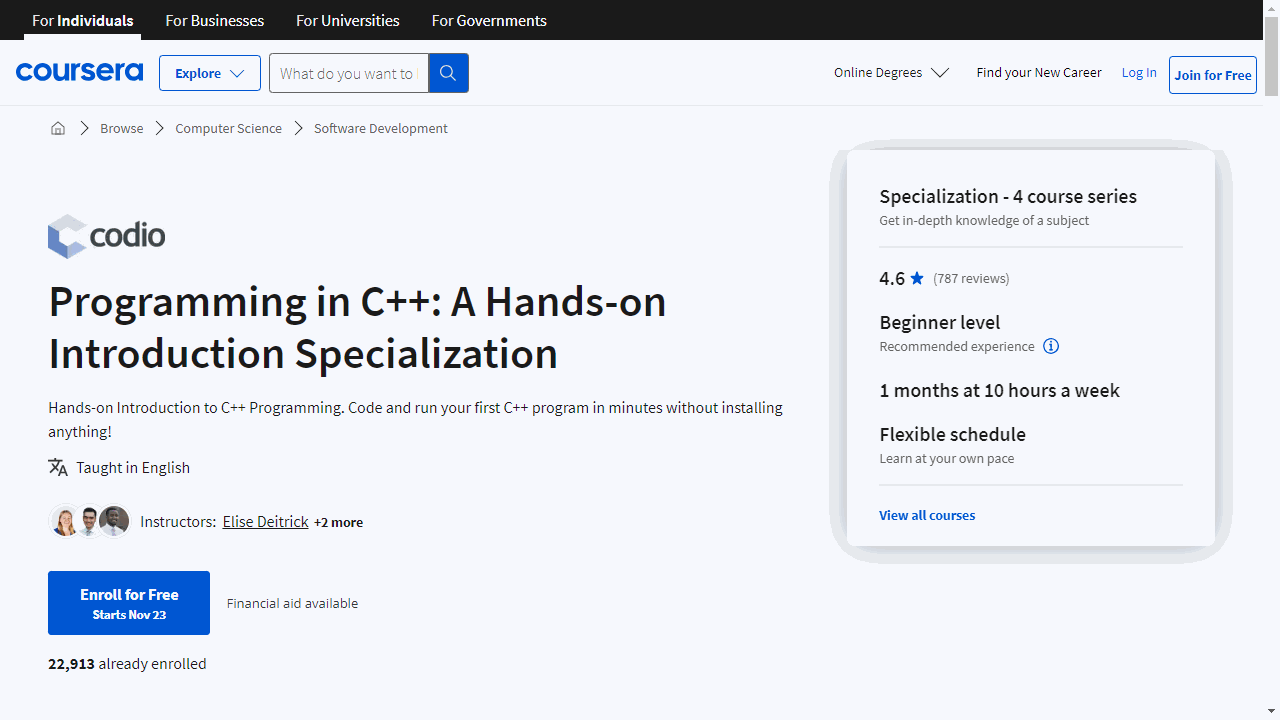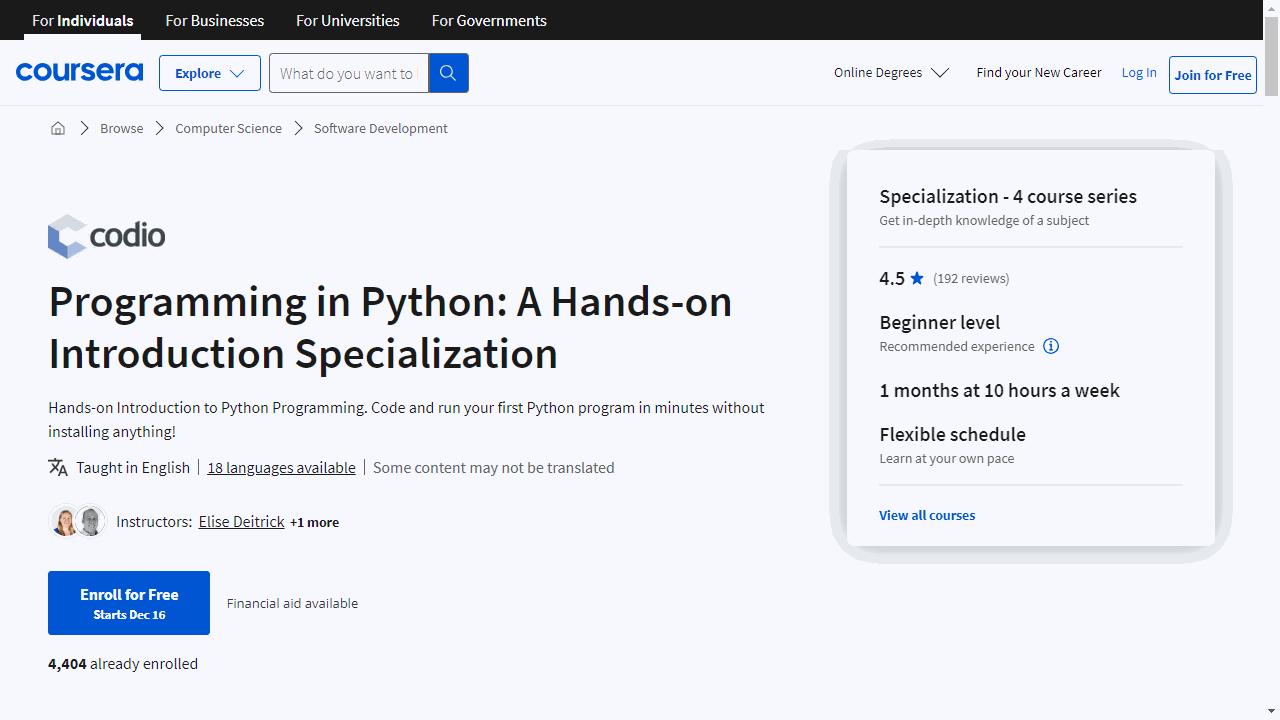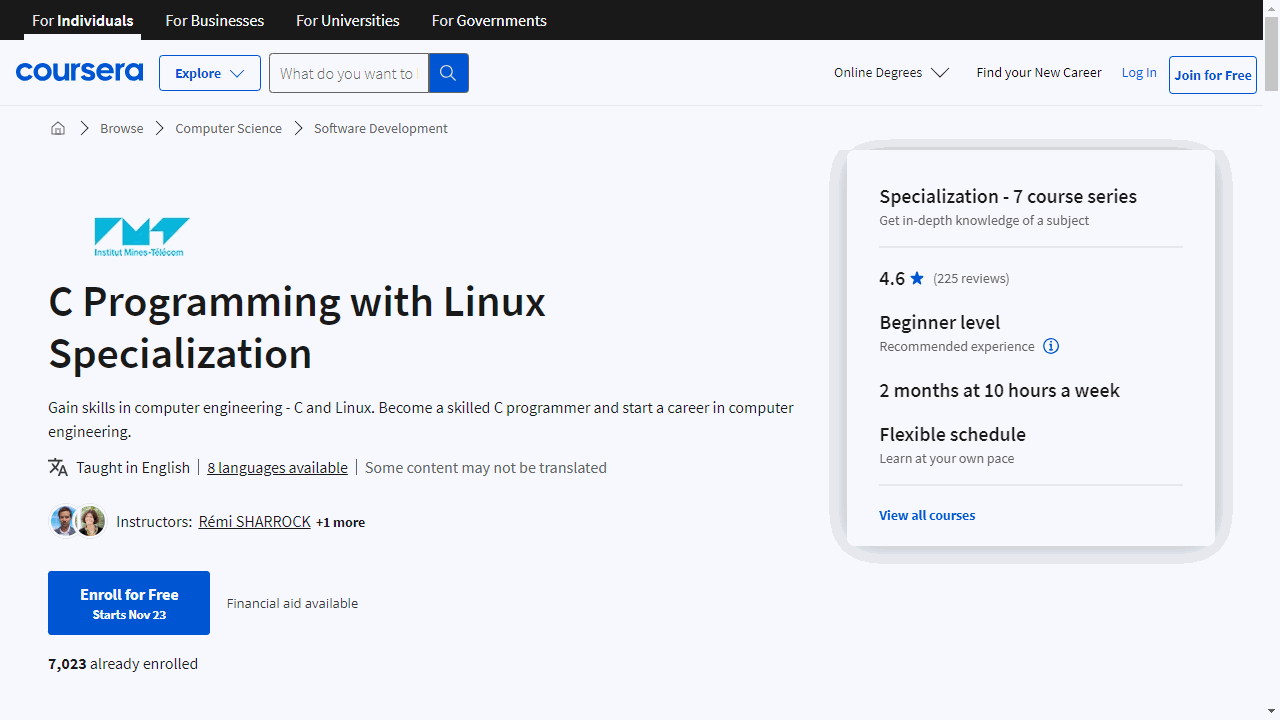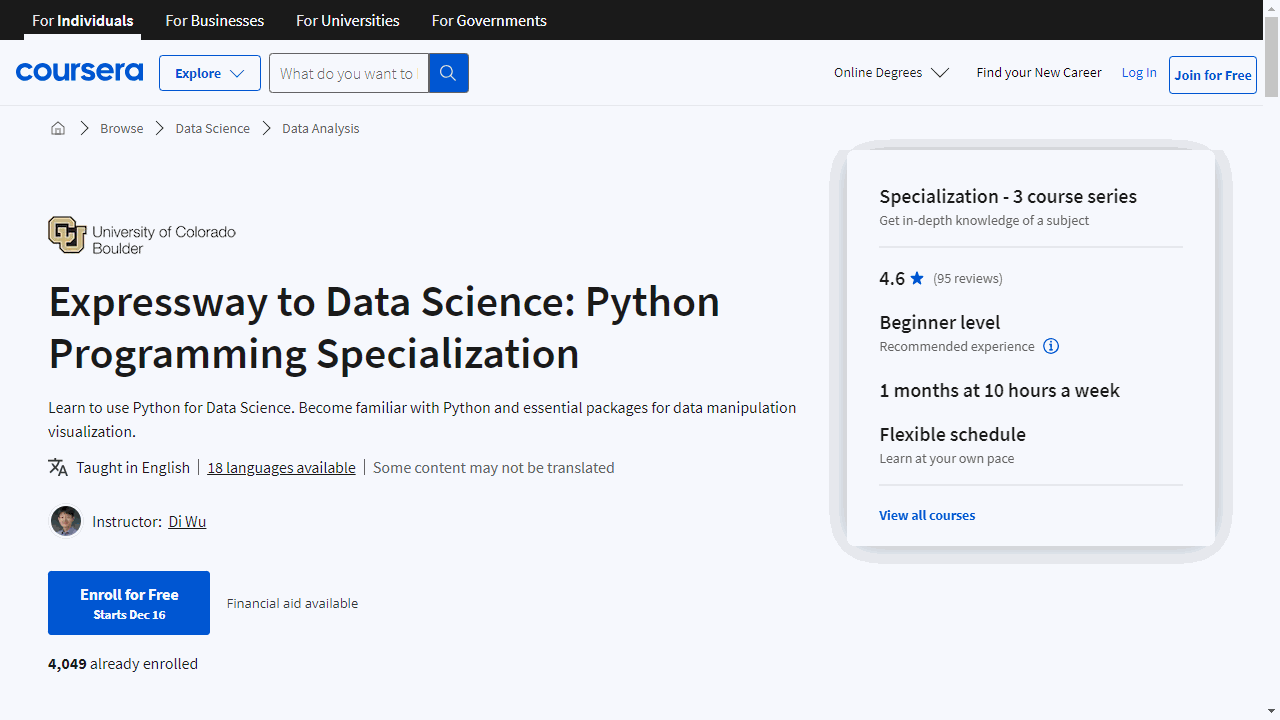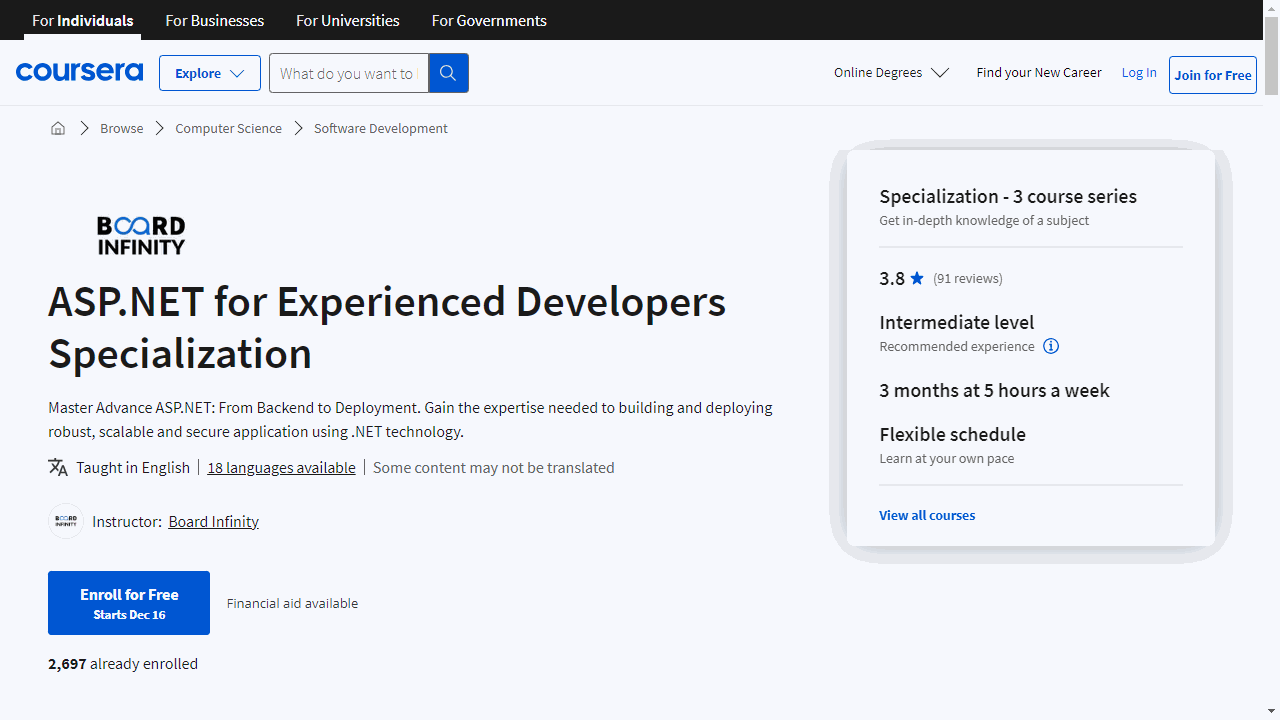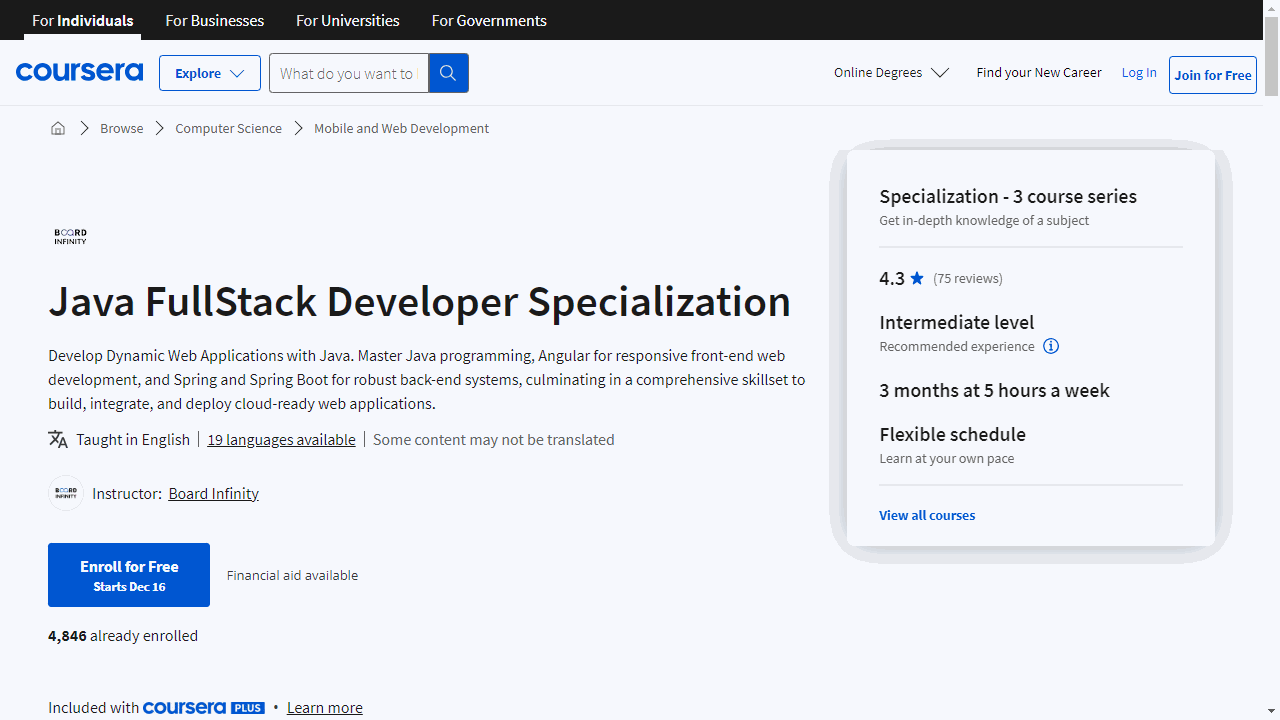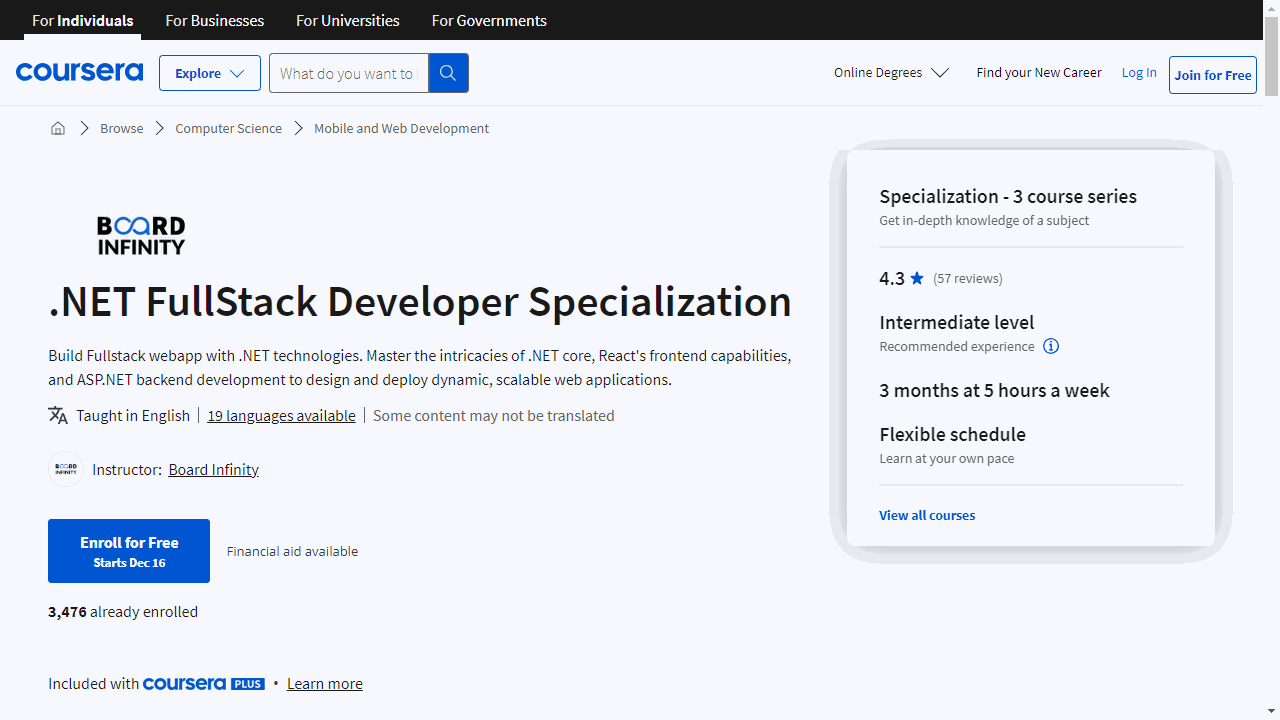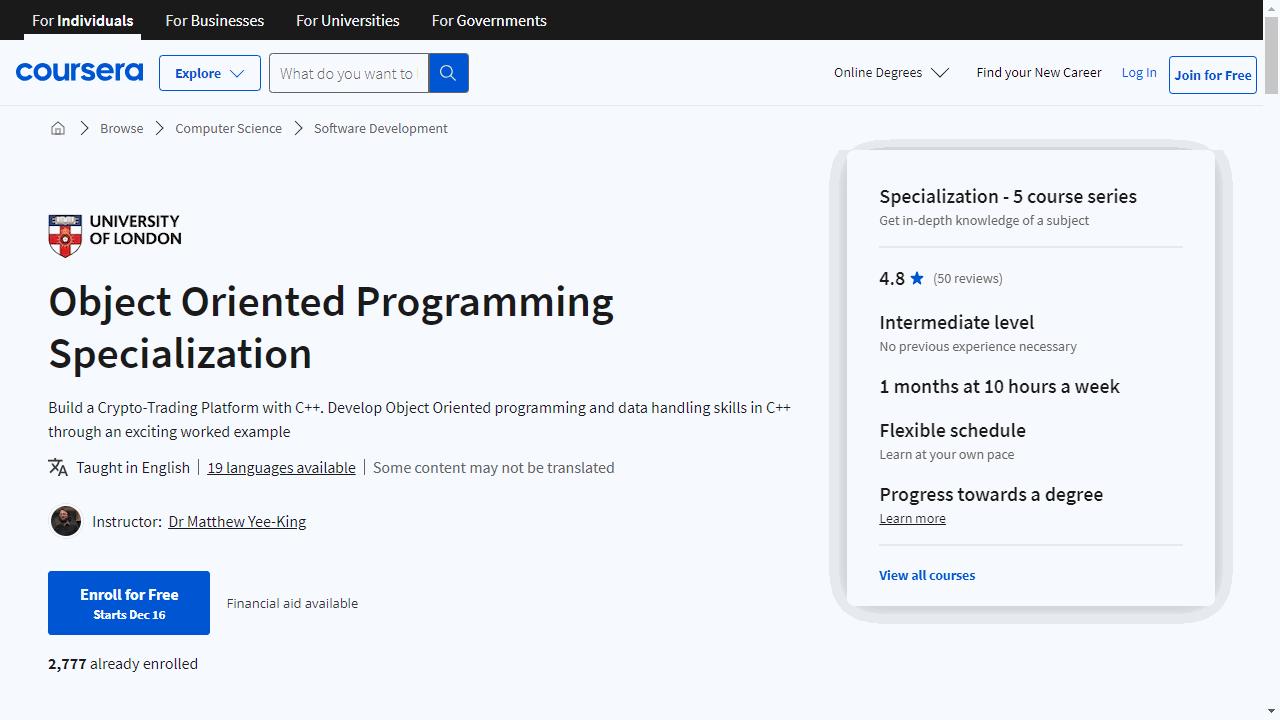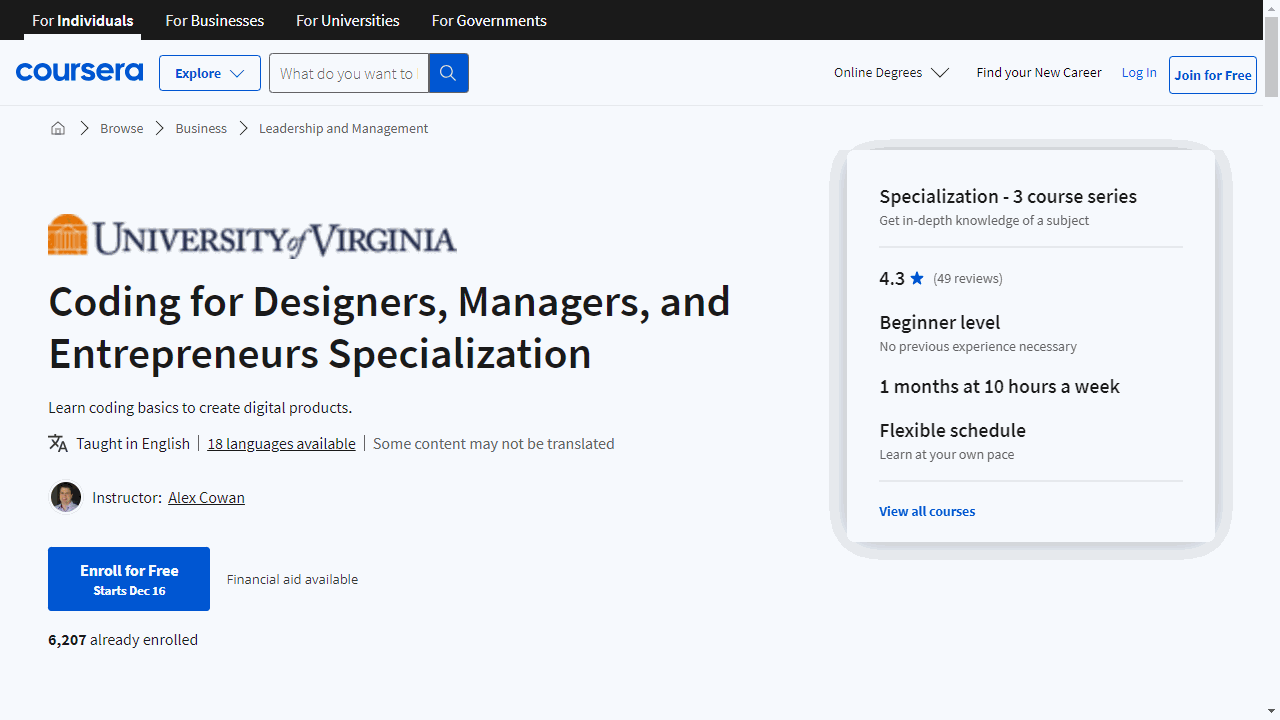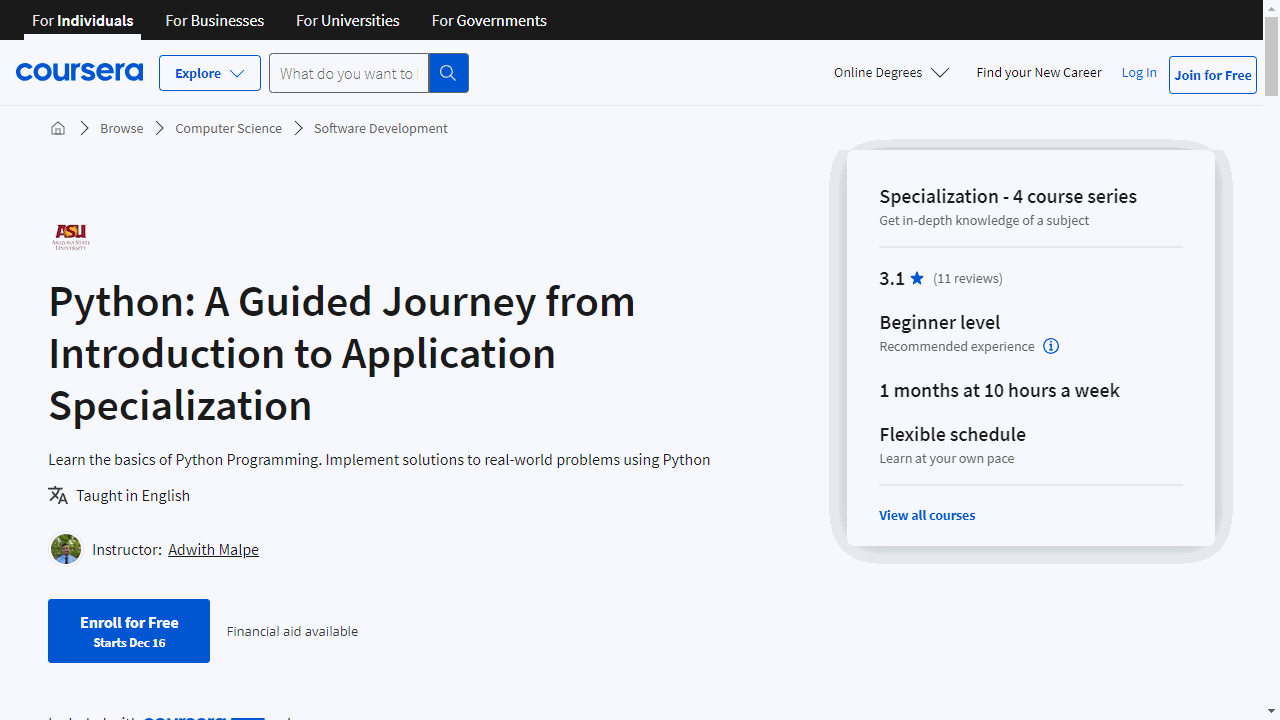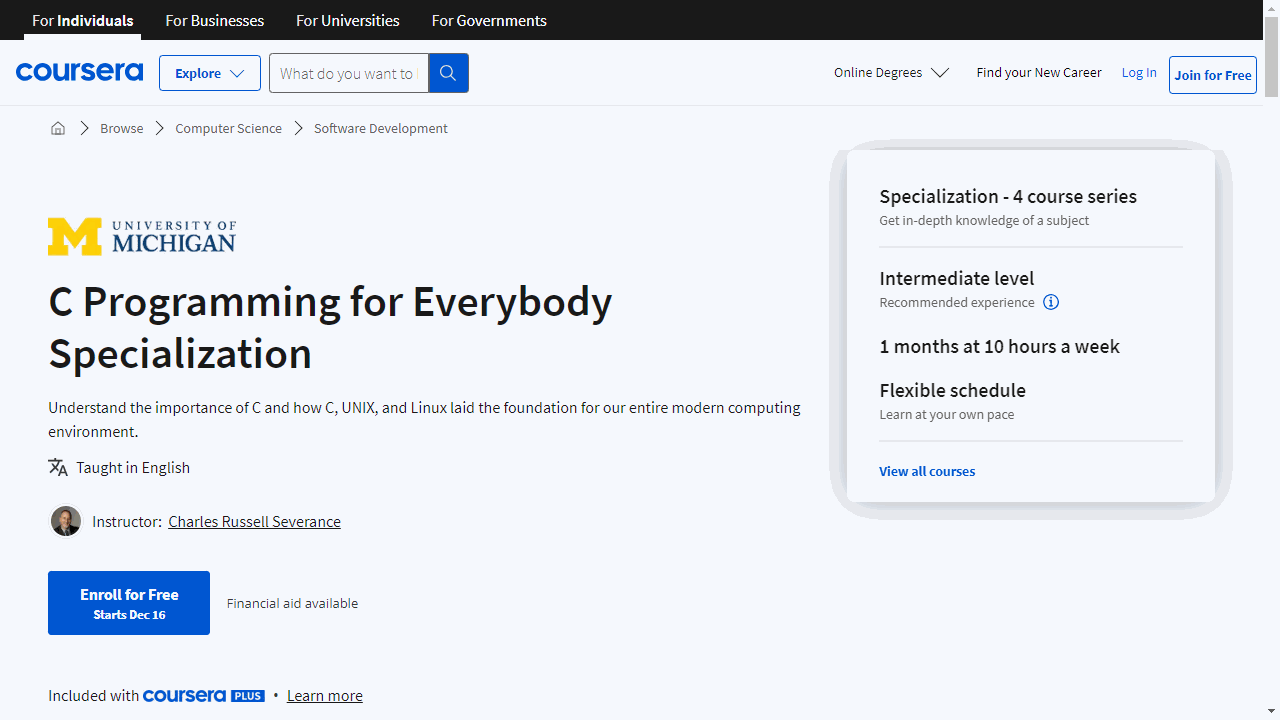Programming is the art of crafting instructions for computers, enabling them to perform tasks and solve problems.
It’s the foundation of our digital world, driving everything from mobile apps and websites to sophisticated AI systems.
Learning to program empowers you to automate tasks, build solutions, and contribute to the ever-evolving tech landscape.
Finding the right programming course on Coursera can feel overwhelming, with so many options catering to diverse skill levels and interests.
You’re searching for a course that’s comprehensive, engaging, and taught by experts, guiding you from beginner to confident programmer.
For the best overall programming course on Coursera, we recommend the Python 3 Programming Specialization offered by the University of Michigan.
This five-course specialization is specifically designed for beginners with no prior programming experience, providing a solid foundation in Python, one of the most popular and versatile programming languages.
Through interactive video lectures and hands-on exercises, you’ll learn fundamental concepts like data structures, conditional logic, and loops, progressing to more advanced topics like file I/O, APIs, and object-oriented programming.
The emphasis on practical coding skills ensures you can apply what you learn to real-world projects, building a portfolio that showcases your abilities.
While the Python 3 Programming Specialization is our top recommendation, Coursera offers a diverse range of programming courses to suit every learning style and goal.
Keep reading to discover more options, from introductory courses to specialized tracks for specific languages like Java, C++, and JavaScript.
Python 3 Programming Specialization
Provider: University of Michigan
The Python 3 Programming Specialization is a top-rated series of five courses designed specifically for beginners with no prior experience.
Through hands-on exercises and engaging video lectures, you’ll gain a strong foundation in Python, one of the most popular and in-demand programming languages today.
The courses progressively build your skills, starting with Python basics like data structures, conditional logic, and loops before advancing to more complex topics like file I/O, APIs, and object-oriented programming.
The specialization emphasizes practical coding skills you can apply right away.
You’ll get lots of practice debugging code and building real-world projects like a social media data analyzer and an image processing application.
The final course lets you integrate APIs and libraries like Tesseract and OpenCV into impressive portfolio projects covering detecting faces and extracting text from images.
With over 150,000 enrollments, this specialization has proven effective for absolute beginners.
The courses stick to simple explanations and avoid unnecessary jargon. Skilled instructors guide you every step of the way with clear examples and hands-on exercises. You’ll build key programming abilities through repetition and experimentation.
Java Programming and Software Engineering Fundamentals Specialization
Provider: Duke University
This comprehensive 5-course specialization provides you with a solid foundation in core programming concepts and Java skills.
Java is not as easy to learn as Python, but it’s a powerful language used by many top companies for building enterprise applications.
The first course starts with the basics, teaching you how to think like a programmer and solve problems using JavaScript, HTML and CSS. You’ll learn key building blocks like functions, loops and conditionals while creating an interactive image filter web page.
From there, the courses quickly level up your skills.
The Java Programming course teaches you how to build algorithms, debug code and write programs that manipulate images and data. By the end, you’ll have analyzed CSV files to determine baby name popularity.
The third course expands your abilities using arrays, lists and structured data. You’ll read and write data files, perform quantitative analyses and create complex programs using multiple Java classes.
Next, you’ll take on even bigger challenges involving software design principles and interfaces. You’ll write programs that sort earthquake data and generate predictive text.
Finally, you’ll put all your new skills to work by creating movie and book recommendation systems, just like Netflix and Amazon use.
This will not be the easiest specialization you can take when first starting out, but it will give you a solid foundation in Java and software engineering.
MATLAB Programming for Engineers and Scientists Specialization
Provider: Vanderbilt University
Starting with “Introduction to Programming with MATLAB” where you’ll learn essential programming concepts like variables and functions, and how to manage data types in MATLAB.
This course stands out because MATLAB simplifies complex problems, making it a valuable skill for your career.
Plus, you get a free MATLAB Online license and access to an eBook for extra support.
Next, “Mastering Programming with MATLAB” builds on what you’ve learned.
Dive into advanced programming techniques such as recursion and vectorization.
You’ll also explore Object Oriented Programming and design your own graphical user interfaces.
This course is designed to make your code more efficient and your applications more robust.
For those interested in data and visuals, “Introduction to Data, Signal, and Image Analysis with MATLAB” is ideal.
You’ll discover how to represent and manipulate signals, images, and data in MATLAB.
Learn data visualization for complex datasets, apply machine learning for prediction, and master image processing techniques.
This course equips you with the skills to analyze and present data effectively.
Object Oriented Programming in Java Specialization
Provider: UC San Diego, Duke University
The first course starts with the basics - you’ll learn how to code in Java, solve problems through programming, and design algorithms.
At the end, you’ll build a program that analyzes data to determine baby name popularity. This lays the foundation you need as a beginner programmer.
The second course builds on those skills. You’ll learn how to work with data files, arrays, and lists to build more complex programs. A key project is writing an encryption program.
The third course is where you’ll master object oriented programming.
This is a crucial concept for professional and personal programming projects. With a unique course structure, you can progress at your own pace. The final project involves building a graphical user interface program.
Finally, you’ll learn how to work with large data sets. The program you build will manage and analyze text data. You’ll compare algorithms and data structures to optimize efficiency.
Coding for Everyone: C and C++ Specialization
Provider: University of California, Santa Cruz
This specialization begins with “C for Everyone: Programming Fundamentals,” a course tailored for beginners.
You’ll learn to write, compile, and debug your first programs, gaining a solid foundation in arrays, pointers, and functions.
This course demystifies coding, setting you up for success with no prior experience necessary.
Next, “C for Everyone: Structured Programming” takes your foundational knowledge further.
It’s essential to complete the fundamentals course before diving into this one, as it builds on what you’ve already learned.
You’ll enhance your C skills and get an introductory peek at C++, preparing you for more advanced programming concepts.
For those already comfortable with C, “C++ For C Programmers, Part A” transitions you into the world of C++.
This course focuses on converting C programs to C++ and introduces you to essential container classes and Dijkstra’s algorithm, expanding your problem-solving toolkit.
Lastly, “C++ For C Programmers, Part B” rounds out your learning experience.
Here, you’ll delve into the Standard Template Library, explore inheritance logic, and compare game-playing algorithms.
This course is designed to refine your C++ skills and give you a competitive edge.
With a practical, hands-on approach, you’ll acquire skills that are highly sought after across various industries.
By dedicating just ten hours a week, you can transform your understanding of coding with these well-structured and expert-led courses.
Introductory C Programming Specialization
Provider: Duke University
This four-course series will take you from having zero knowledge to being able to write complex C programs by the end.
The first course, Programming Fundamentals, is the perfect introduction.
You’ll learn the core concepts of programming like algorithms, pseudocode, and problem solving strategies. The instructor does a great job breaking down the foundational skills in an approachable way.
In the second course, Writing, Running, and Fixing Code in C, you’ll go from planning programs to actually writing real C code.
The course guides you through compiling, running, testing, and debugging programs. This is where you’ll start to feel like a real programmer!
The third course covers more advanced topics like pointers, arrays, and recursion.
These powerful techniques will allow you to write far more complex programs. The teacher takes the time to explain these concepts clearly.
Finally, the fourth course shows you how to build programs that interact with users, files, and manage memory dynamically. You’ll learn skills like taking user input, reading and writing files, and allocating memory as needed while a program runs.
By the end of the Specialization, you’ll be able to code in C with confidence.
You’ll have a portfolio of programs showcasing your new skills to share with employers or to build on for future learning.
Object Oriented Java Programming: Data Structures and Beyond Specialization
Provider: UC San Diego
The journey begins with “Object Oriented Programming in Java,” where you’ll enhance your Java skills by learning the principles of Object Oriented Programming.
This course isn’t just about theory; you’ll apply what you learn by building a project that interests you, using advanced Java features and graphical user interfaces.
As you progress to “Data Structures and Performance,” you’ll delve into the mechanics of handling large data sets efficiently.
By exploring industry-standard data structures like linked lists, trees, and hashtables, you’ll understand how to optimize your programs for speed and flexibility.
The course emphasizes the importance of Big-O analysis, equipping you with the ability to evaluate the performance of your algorithms.
In “Advanced Data Structures in Java,” you’ll tackle real-world problems using complex data structures such as graphs.
The course culminates in a project where you’ll create a route planning application, applying the concepts you’ve learned to a tangible challenge.
This module also focuses on writing maintainable code, an essential skill for any software engineer.
“Mastering the Software Engineering Interview” prepares you for the job market.
This course offers a blend of technical problem-solving practice and communication skills development, with insights from Google’s teams.
You’ll engage in mock interviews and team exercises, building the confidence needed to excel in technical interviews.
The specialization wraps up with the “Capstone: Analyzing (Social) Network Data,” where you’ll apply all the skills you’ve acquired to analyze complex social networks.
This project-based finale gives you the freedom to explore data and draw meaningful conclusions, showcasing your ability to handle real-world data analysis tasks.
Introduction to Scripting in Python Specialization
Provider: Rice University
This series of courses guides you from the basics to advanced scripting in Python, a language known for its versatility and popularity in the tech industry.
Start with “Python Programming Essentials” to grasp the core concepts of programming, including writing basic Python programs.
You’ll explore expressions, variables, functions, and more, using the user-friendly CodeSkulptor environment that runs in your web browser, making it easy to practice without any software installation hassles.
Progress to “Python Data Representations” where you’ll delve into data types like strings, lists, and tuples, and learn how to manage files.
This course empowers you to manipulate data and craft more intricate Python scripts, enhancing your problem-solving capabilities.
In “Python Data Analysis,” you’ll tackle tabular data and CSV files, essential skills for data processing tasks.
This course will sharpen your ability to handle complex data sets, preparing you for real-world data analysis challenges.
Cap off your learning with “Python Data Visualization,” where you’ll master the art of turning data into compelling visual stories.
You’ll learn to install Python packages, extract web data, and create insightful visualizations, rounding out your scripting expertise.
Throughout these courses, Python 3 is the focus, ensuring you’re up-to-date with the current standards of Python programming.
You’ll also transition from online to desktop development environments, giving you the versatility to code on your computer.
By completing this specialization, you’ll gain practical skills in debugging, understand Python syntax and semantics, and become proficient in using lists, tuples, and other data structures.
SAS Programmer Professional Certificate
Provider: SAS
Start with “Getting Started with SAS Programming” to build a solid foundation.
You’ll learn to navigate SAS Studio and craft programs that manage data from various sources, including SAS, Microsoft Excel, and text files.
This course equips you with the skills to explore and refine data, compute new columns, and even leverage SQL within SAS for table operations.
No prior SAS knowledge is required, just a basic understanding of computer software.
Once you’ve mastered the basics, “Doing More with SAS Programming” is your next step.
This course is ideal if you’re familiar with SAS and eager to delve deeper into data manipulation.
You’ll gain hands-on experience with DATA step processing, use functions to alter data, create custom formats, and merge tables.
Before jumping in, make sure you’re comfortable with DATA step code, sorting, and formatting in SAS.
To showcase your skills, the “Preparing for the SAS Programming Certification Exam” course offers a practical way to apply what you’ve learned.
It’s a comprehensive review that prepares you for the SAS Certified Specialist: Base Programming Using SAS 9.4 Exam, covering realistic problem-solving scenarios.
For additional practice, “Practicing for the SAS Programming Certification Exam” provides more complex problems, further solidifying your readiness for the certification exam.
These courses not only enhance your programming skills but also prepare you for a certification that’s recognized in the tech industry.
You’ll learn directly from SAS experts, ensuring you’re up-to-date with the latest in data science, machine learning, and artificial intelligence.
Programming with Google Go Specialization
Provider: University of California, Irvine
This series of courses is designed to introduce you to Go, a programming language developed by Google that emphasizes simplicity and efficiency.
Let’s break down what each course has to offer.
The journey begins with “Getting Started with Go.”
This course is tailored for those who have some programming experience, making the transition to Go smoother if you’re already familiar with languages like C, Python, or Java.
You’ll learn the fundamentals of Go, including data types and how to work with protocols and formats such as RFCs and JSON.
The interactive aspect of writing and refining Go programs with peer feedback is a standout feature, ensuring that you’re not just passively learning but actively engaging with the material.
Moving on to “Functions, Methods, and Interfaces in Go,” you’ll delve deeper into Go’s capabilities.
This course focuses on functions and methods, which are crucial for writing clean and efficient code.
You’ll also explore how Go handles object-orientation, a concept familiar to many programmers but with a unique twist in Go.
The practical experience gained from developing your own Go applications is invaluable, reinforcing the concepts covered in the lessons.
Lastly, “Concurrency in Go” introduces you to one of Go’s most powerful features: concurrent programming.
Understanding how to write concurrent code is essential in today’s fast-paced computing environment.
Through hands-on exercises, you’ll learn about goroutines and channels, the building blocks of concurrency in Go.
This knowledge is particularly useful for creating responsive applications that can handle multiple tasks simultaneously.
When you finish, you’ll have a strong grasp of Go and its concurrent programming model, setting you up for success in a field where performance and efficiency are highly valued.
C# Programming for Unity Game Development Specialization
Provider: University of Colorado System
This specialization is made up of 4 courses that will take you from no prior coding knowledge to building your own Unity games with C# by the end.
The first course starts with writing your very first lines of code in C# and builds up core programming concepts like variables, classes, loops, and more. You’ll get hands-on experience applying these concepts by building simple console games.
In the second course, you’ll dive deeper into C# and Unity.
You’ll learn how to get user input, use loops for repetition, and work with data structures like arrays and lists. By the end, you’ll expand on a Unity game you built in course 1.
The third course focuses on code abstraction and object-oriented principles.
You’ll learn how to organize code into classes and methods for reusability. This will prepare you to build Unity classes for your games. You’ll also add text, scores, and sound effects to make your games come alive!
The final course takes your skills to an intermediate level.
You’ll implement robust game features like file input/output, inheritance, and event handling. By the end, you’ll build a complete small Unity game yourself!
Introduction to Programming with Python and Java Specialization
Provider: University of Pennsylvania
This series of courses is crafted to elevate your skills in Python and Java, two languages that are highly sought after in the tech industry.
Kick off your programming journey with “Introduction to Python Programming.”
This course isn’t just an overview; it’s a deep dive into Python, where you’ll grasp essential programming concepts such as data structures and functions.
You’ll quickly move from learning the syntax to actively writing and running Python code, setting a strong foundation for your programming skills.
Move on to “Data Analysis Using Python,” where you’ll harness the power of Python for data science.
Here, you’ll get familiar with pandas, numpy, and matplotlib—tools that are vital for data analysis.
You’ll learn to manipulate and visualize data, answering real-world questions through hands-on exercises.
Shift gears to Java with “Introduction to Java and Object-Oriented Programming.”
Java’s robustness makes it ideal for a wide range of applications, and you’ll understand why as you delve into object-oriented programming principles.
You’ll practice writing Java code in Eclipse, a popular integrated development environment, and learn to test your code effectively using unit testing.
Finally, “Inheritance and Data Structures in Java” will deepen your Java expertise.
You’ll explore inheritance, a cornerstone of OOP that allows for code reusability.
You’ll also tackle Java’s data structures, learn to manage files, and refine your debugging skills with Eclipse’s debugger.
This course will enable you to write more sophisticated and efficient Java programs.
Each course is interactive, emphasizing practical coding exercises over mere theory.
You’ll emerge with the ability to write functional programs, analyze data, and debug code—skills that are in high demand.
Introduction to Computer Science and Programming Specialization
Provider: University of London
This specialization offers a well-rounded introduction to the field of computer science.
It balances theory with practice, ensuring that you gain a robust understanding of both how computers work and how to make them work for you.
The “Introduction to Computer Programming” course is tailored for beginners and takes you through the fundamentals of writing computer programs.
You’ll learn how to edit and run programs, and then quickly move on to creating 2D graphics.
The interactive element is a highlight, as you’ll use your coding skills to solve puzzles in a game developed specifically for this course.
The use of Javascript and the p5.js library ensures that you’re learning with tools that are both relevant and widely used in the industry (web development).
Moving on to “How Computers Work,” this course demystifies the inner workings of the devices we use daily.
It’s not about memorizing steps to operate software; it’s about understanding the underlying principles that apply to any computer system.
This knowledge is invaluable, whether you’re troubleshooting issues or simply aiming to use technology more effectively.
It’s also a gentle introduction to the kind of material you might encounter in a computer science degree, making it a smart choice for those considering further education.
Lastly, “Mathematics for Computer Science” offers a practical approach to the mathematical concepts that underpin computer science.
From number bases to functions and graphs, the course presents these topics in the context of real-world applications.
You’ll learn how to apply mathematical tools to solve problems, such as encrypting messages or designing computer graphics.
This course not only demystifies math but also shows how it’s an integral part of computing.
Programming in C++: A Hands-on Introduction Specialization
Provider: Codio
This series is a practical, step-by-step journey into the world of C++, tailored for those with little to no coding background.
Start with “C++ Basics: Selection and Iteration,” where you’ll swiftly code your first C++ program, bypassing any setup hassles.
This course lays the groundwork, teaching you to manipulate data with variables and operators, automate tasks with selection statements, and efficiently repeat processes using loops.
It’s a foundational course that equips you with essential skills and a strong understanding of basic computer science concepts.
Progress to “C++ Basic Structures: Vectors, Pointers, Strings, and Files,” which builds on your newfound knowledge.
Here, you’ll learn to manage collections of data using vectors, navigate through your code with pointers, handle textual data with strings, and perform file operations.
This course ensures you’re comfortable with more complex data structures, setting you up for success in advanced programming tasks.
As you advance, “C++ Object Basics: Functions, Recursion, and Objects” introduces you to the power of functions for modular code, recursion for complex problem-solving, and objects for organizing your code.
This course is like the toolkit that helps you refine your coding approach, making your programs more efficient and your coding style more sophisticated.
The final course, “Object-Oriented C++: Inheritance and Encapsulation,” takes you into the realm of object-oriented programming.
You’ll learn to design robust programs using inheritance to share functionality and encapsulation to protect data integrity.
This course is the capstone of your learning experience, where you apply principles that are fundamental to professional C++ development.
Each course in this specialization is interactive and self-paced, featuring a video-free format that emphasizes hands-on learning.
You’ll engage with the material through immediate feedback on exercises, ranging from quick quizzes to coding tasks.
This approach ensures a deeper understanding of the material, as you’re actively involved in the learning process.
It’s designed to take you from beginner to proficient, with a focus on practical skills that are applicable across various programming languages.
Programming in Python: A Hands-on Introduction Specialization
Provider: Codio
Kick off your journey with “Python Basics: Selection and Iteration.”
You’ll grasp how to manipulate data with variables, make smart decisions in your code, and efficiently repeat tasks using loops.
It’s the foundation you need to start thinking and solving problems like a programmer.
After mastering the basics, you’ll progress to “Python Basic Structures: Lists, Strings, and Files.”
This course empowers you to manage collections of data, work with text, and handle file input and output, including CSV files.
It’s essential to complete the first course to fully benefit from this one.
Then, “Python Object Basics: Functions, Recursion, and Objects” introduces you to functions for streamlined code, recursion for specific problems, and objects for structured programming.
This course builds on the previous ones, so it’s crucial to have those skills down pat.
Finally, “Object-Oriented Python: Inheritance and Encapsulation” will elevate your coding skills.
You’ll learn to design complex programs with object-oriented principles, reuse code effortlessly with inheritance, and protect data with encapsulation.
This course is the capstone, bringing together all the concepts you’ve learned.
Each course is interactive and self-paced, focusing on hands-on learning.
You’ll engage with assignments that include immediate feedback, ensuring you understand each concept before moving on.
The exercises are designed to be short and effective, respecting your time and maximizing learning.
By the end of this specialization, you’ll not only understand computer science fundamentals but also be proficient in Python programming.
You’ll be equipped to automate tasks, manage data, and create your own Python programs using object-oriented techniques.
C Programming with Linux Specialization
Provider: Dartmouth College, Institut Mines-Télécom
This specialization is designed to build a strong foundation in both C programming and Linux, two critical skills for modern tech professionals.
The journey begins with “C Programming: Getting Started,” where you’ll hit the ground running, coding directly in your browser.
This course simplifies the learning process, making it accessible even if you’ve never written a line of code.
You’ll learn to create basic programs, handle variables, and use loops to automate tasks.
As you progress to “C Programming: Language Foundations,” you’ll tackle logical statements and arrays, essential tools for data organization and decision-making.
This course also introduces you to algorithms for sorting and searching, skills that are transferable across many programming languages and highly valued in the tech industry.
In “C Programming: Modular Programming and Memory Management,” the focus shifts to functions and pointers, demystifying how memory is accessed and managed in C.
The course’s innovative tools help visualize these complex concepts, ensuring you understand pointers thoroughly, a topic often considered challenging by new programmers.
Building on this knowledge, “C Programming: Pointers and Memory Management” delves deeper into pointer arithmetic and dynamic memory allocation, empowering you to manage memory efficiently and write more sophisticated programs.
The fifth course, “C Programming: Advanced Data Types,” teaches you to define and manipulate your own data types.
This ability allows for more structured and efficient data handling, a skill that can significantly enhance the functionality of your programs.
“Linux Basics: The Command Line Interface” transitions your focus to Linux, the operating system that powers countless devices and servers worldwide.
You’ll become proficient in navigating the Linux file system and using command-line tools, a must-have skill for any serious developer.
Finally, “C Programming: Using Linux Tools and Libraries” rounds out the specialization by introducing you to the professional environment of C programming within Linux.
You’ll learn to utilize libraries, compile multiple source files, and automate building processes with makefiles.
By the end of the specialization, you’ll have a solid grasp of C programming, command-line proficiency, and the ability to work with Linux tools and libraries, setting you up for success in the tech industry.
Expressway to Data Science: Python Programming Specialization
Provider: University of Colorado Boulder
This specialization offers a clear path to mastering Python, even if previous attempts at learning programming left you frustrated.
Kick off your journey with “Introduction to Python Fundamentals.”
This course eases you into programming, teaching you how to craft simple Python programs using variables, operators, and flow control.
The pace is set by you, ensuring a comfortable learning experience.
Next, “Introduction to Python Functions” takes you deeper.
You’ll learn to use and define functions, streamlining your code and enhancing its reusability.
This skill is crucial for writing efficient programs that can handle a variety of tasks with ease.
Finally, “Python Packages for Data Science” equips you with the tools for data manipulation and visualization.
You’ll become proficient in using Pandas and Numpy for data handling, and Matplotlib and Seaborn for creating impactful visualizations.
These are essential skills for any budding data scientist.
By completing these courses, you’ll not only understand Python programming but also be prepared to delve into data science projects.
You’ll have the confidence to manipulate data and turn it into compelling visual stories.
ASP.NET for Experienced Developers Specialization
Provider: Board Infinity
This is a great specialization if you want to refine and expand your skill set in the ASP.NET ecosystem.
Kick off with “C# for .NET Developers” to solidify your foundation in C#.
You’ll start with programming essentials—variables, data types, and control structures—and advance to object-oriented programming, tackling concepts like inheritance and encapsulation.
The course also delves into LINQ and asynchronous programming, equipping you with the tools to build dynamic web applications with confidence.
Move on to “Backend Development using ASP.Net” to master the creation of robust backend systems.
This course zeroes in on ASP.NET Core, MVC, and Web API.
You’ll learn to manage middleware, create MVC-based views and models, and handle RESTful APIs.
It’s all about developing scalable, high-performance backend applications that stand up to real-world demands.
Finally, “Microservices and Deployment by using ASP.NET” takes you through the microservices architecture, teaching you to design, develop, and deploy using ASP.NET Core.
You’ll get hands-on experience with Docker, learning to containerize applications for streamlined deployment.
Plus, you’ll adopt DevOps practices with Azure DevOps for continuous integration and delivery, ensuring your projects are always at the cutting edge.
By the end of this specialization, you’ll have a comprehensive understanding of the .NET framework, C#, and ASP.NET’s core technologies.
You’ll be adept at building and managing microservices, containerizing applications, and implementing DevOps workflows.
Java FullStack Developer Specialization
Provider: Board Infinity
This specialization is a direct path to mastering Java and web development with a clear, hands-on approach.
In “Fundamentals of Java Programming,” you’ll build a strong foundation in Java.
You’ll understand the workings of the JVM, JRE, and JDK, and grasp the essentials of Java syntax and object-oriented programming.
This course ensures you’re well-equipped to write effective Java code and handle advanced concepts like exception handling.
Moving on to “Frontend for Java Full Stack Development,” you’ll learn to craft engaging websites with HTML and CSS, and bring them to life with JavaScript.
The course culminates with Angular, teaching you to develop dynamic web applications.
You’ll gain the skills to create visually appealing and interactive user experiences.
The “Data Structures & Backend with Java” course takes you deeper into the backend aspect of development.
You’ll learn to manage data with Java’s data structures and leverage the power of Spring and Spring Boot for building applications.
Additionally, you’ll design secure RESTful web services, a critical skill for modern software development.
By completing these courses, you’ll have a comprehensive skill set in Java programming, front-end technologies, and back-end systems.
You’ll be ready to build full-stack applications that are both functional and aesthetically pleasing.
This specialization is a concrete step towards a promising career in software development, providing you with the expertise that’s in high demand in the tech industry.
So, if you’re aiming to become a proficient Java FullStack Developer, this specialization is precisely what you need.
It’s practical, detailed, and focused on the most relevant technologies and frameworks.
.NET FullStack Developer Specialization
Provider: Board Infinity
This specialization is a comprehensive journey through .NET development, equipping you with the skills to build robust web applications from the ground up.
In the “.Net Full Stack Foundation” course, you’ll start by unraveling the essentials of ASP.NET and the .NET framework, paired with the powerful C# language.
You’ll learn to create dynamic web applications, understand .NET tools, and tackle basic programming techniques.
As you progress, the course delves into C# fundamentals, covering syntax, variables, and control structures.
The advanced module takes you deeper, introducing complex concepts like LINQ and object-oriented programming, ensuring you’re ready to handle sophisticated coding challenges.
Moving on to “Frontend Development using React,” you’ll grasp the building blocks of web development with HTML and CSS, learning to structure and style web pages effectively.
JavaScript fundamentals come next, setting the stage for interactive web features.
Then, React takes center stage, teaching you to craft user interfaces and manage application state, preparing you to build engaging and responsive web applications.
The “Backend Development for .Net Full Stack” course rounds out your education, focusing on the server-side of applications.
You’ll get to grips with ASP.NET Core’s architecture, dive into the MVC pattern with ASP.NET MVC, and design RESTful web services using ASP.NET Web API.
By the end, you’ll have the expertise to develop secure, scalable backend systems that form the backbone of any web application.
Throughout these courses, you’ll acquire a rich set of skills, including .NET Core, C#, ASP.NET, HTML, React, JavaScript, and CSS.
You’ll master the .NET framework, sharpen your C# programming abilities, and learn to manage advanced features like asynchronous code and custom exceptions.
With this specialization, you’re not just learning to code; you’re becoming a versatile developer capable of handling the full stack of .NET development.
Object Oriented Programming Specialization
Provider: University of London
This series of five courses is a practical journey from C++ fundamentals to crafting a fully functional crypto-currency exchange platform, emphasizing the power of object-oriented programming (OOP).
Starting with “Introduction to Object-Oriented Programming in C++,” you’ll dive into writing and running your first program.
You’ll master text interactions and create an interactive menu, setting the foundation for more complex coding tasks.
As you progress to “C++ Programming: Classes and Data,” you’ll explore the world of C++ classes, essential for organizing and managing data.
You’ll learn to design and implement these classes, a critical step in any programmer’s toolkit.
In “Object-Oriented Programming in C++: Functions,” the focus shifts to exception handling and file reading—key skills for managing data and turning algorithms into functional code.
You’ll gain confidence in processing data and handling unexpected events in your programs.
“Working with Objects in C++” will challenge you to implement a matching engine for your crypto-currency platform.
Here, you’ll refine your skills in iterating over objects and ensuring your algorithms work as intended, all while writing robust code.
Finally, “Use C++ to build a Crypto Trading Platform: Final System” brings all your skills together.
You’ll complete your project, learning to model real-world scenarios in code and make informed decisions about using static versus non-static functions.
Throughout these courses, you’ll acquire a solid grasp of syntax, control flow, and exception handling.
You’ll also become adept at parsing data and understanding algorithms—skills that are in high demand in the tech industry.
By the end of this specialization, you’ll not only have a comprehensive understanding of OOP in C++, but you’ll also have a tangible project to showcase your abilities.
Coding for Designers, Managers, and Entrepreneurs Specialization
Provider: University of Virginia
This trio of courses empowers you with the skills to collaborate effectively with developers and bring digital projects to life.
Start with “Coding for Designers, Managers, & Entrepreneurs I,” where you’ll master HTML and CSS—the foundational elements of the web.
You’ll learn to craft user interfaces that are both visually appealing and user-friendly.
The course also demystifies debugging, equipping you with the tools to troubleshoot code confidently.
Progress to “Coding for Designers, Managers, & Entrepreneurs II,” where interactivity is the name of the game.
Here, JavaScript and jQuery come into play, enabling you to create dynamic user experiences.
You’ll also become proficient with the Chrome debugger, streamlining your coding process and enhancing your problem-solving skills.
The journey culminates with “Coding for Designers, Managers, & Entrepreneurs III,” where you’ll delve into advanced JavaScript to manage application logic and integrate with web APIs like Google Firebase.
This knowledge allows you to construct sophisticated web applications with ease, while analytical debugging techniques keep you in control of your code.
By the end of the specialization, you’ll have honed your digital literacy, making you a valuable asset in any team that straddles design and development.
With guidance from the Darden School’s top-ranked faculty, you’ll emerge as a confident collaborator, ready to tackle the challenges of the digital landscape.
Python: A Guided Journey from Introduction to Application Specialization
Provider: Arizona State University
This specialization is designed for you if you’re curious about coding and eager to learn.
With no prior background in computer science required, you’ll emerge with the confidence and skills to apply Python in various fields, whether you’re aiming to be a software developer, an electrical engineer, or even an aerospace engineer.
Start with “Introduction to Python,” where you’ll grasp the essentials of Python programming without any prior experience.
You’ll get hands-on with tools like IDEs and become fluent in Python syntax, setting a strong foundation for more advanced topics.
Move on to “Data Analysis and Visualization with Python,” where you’ll unlock the power of data.
You’ll learn to manage data using Python’s libraries, such as pandas for data analysis and Matplotlib for crafting visual insights.
Plus, you’ll gain the know-how to troubleshoot and prevent program crashes with exception handling.
With “Object-Oriented Programming and GUI with Python,” you’ll delve into OOP principles, crucial for creating structured and efficient code.
Additionally, you’ll design your own GUIs, making your programs interactive and user-friendly.
Cap off your learning journey with “Introduction to Machine Learning with Python.”
Here, you’ll explore the frontier of machine learning, from supervised to unsupervised learning, and even deep learning.
Deep learning is a subset of machine learning that has broken records in areas like computer vision and natural language processing.
You’ll apply Python to build machine learning models, the skill behind the AI revolution that’s reshaping industries across the globe.
C Programming for Everybody Specialization
Provider: University of Michigan
This Coursera Specialization guides you through the essentials of C programming, a language that’s fundamental to the development of many critical systems like operating systems and databases.
Start with “Exploring C” to grasp the historical impact of C and its basic syntax.
You’ll compare C with Python, understanding their similarities and differences, and appreciate C’s role in the evolution of programming.
In “Programming in C,” you’ll delve into C’s syntax, mastering variables, control flow, and the art of writing recursive functions.
This course empowers you to craft algorithms with precision and efficiency.
“Data Structures in C” introduces you to the management of complex data through dynamic memory allocation, pointers, and structures.
You’ll tackle memory optimization and learn to navigate the intricacies of C’s data handling capabilities.
Finally, “Building Objects in C” bridges the gap between procedural and object-oriented programming (OOP).
You’ll construct a library capable of managing advanced data structures and gain insights into memory allocation and the lifecycle of objects in C.
As you progress, you’ll acquire skills in memory management, understand the nuances of control flow, and develop the ability to create robust recursive functions.
You’ll also become aware of security considerations unique to C programming.
By the end of this specialization, you’ll not only have a deep understanding of C’s syntax and structures but also the competence to apply these concepts to build efficient, secure programs.
Frequently Asked Questions
What is Programming and why is it important?
Programming refers to the process of designing and building computer programs that enable devices or applications to perform specific tasks or solve problems.
It involves writing instructions or code in a programming language that can be understood and executed by computers;
Programming is crucial because it drives the development of software, applications, websites, and systems that power our digital world.
It enables automation, data analysis, artificial intelligence, and countless other technological advancements that shape modern life.
What skills do you need to be good at Programming?
To excel in programming, you need a combination of technical and problem-solving skills.
Strong logical thinking and analytical abilities are essential for understanding complex problems and designing efficient solutions.
Attention to detail and patience are crucial for writing and debugging code.
Additionally, you should have a good understanding of data structures and algorithms, as well as the ability to learn and adapt to new programming languages and technologies.
What common tools should Programming beginners learn?
As a beginner in programming, it’s essential to familiarize yourself with common tools and technologies.
These may include an Integrated Development Environment (IDE) like Visual Studio Code or PyCharm, version control systems like Git, and collaboration platforms like GitHub.
Additionally, you should learn how to use debugging tools, code editors, and package managers specific to the programming language you’re learning.
What jobs can you get with Programming skills?
Programming skills open up a wide range of career opportunities across various industries.
Some common job roles include software developer, web developer, mobile app developer, computer systems analyst, computer programmer, data scientist, machine learning engineer, and software engineer.
Additionally, programming skills are valuable in fields like finance, healthcare, education, and research, where data analysis and automation are essential.
What should I look for in a Programming course for beginners?
When choosing a programming course for beginners, look for a comprehensive curriculum that starts with the fundamentals of programming concepts, syntax, and logic.
The course should provide hands-on practice with coding exercises and projects to reinforce learning.
It should also cover debugging techniques, best practices, and industry-standard tools.
Additionally, seek courses that offer support, such as forums or mentors, to assist you throughout your learning journey.
What are the common uses of Programming across various industries?
Programming has numerous applications across various industries.
In the technology sector, programming drives the development of software, applications, websites, and systems.
In finance and business, programming is used for data analysis, automation, and decision-making.
In healthcare, programming plays a role in medical research, patient record management, and diagnostic tools.
In manufacturing and engineering, programming enables automation, robotics, and computer-aided design.
Additionally, programming is essential for scientific computing, data visualization, and artificial intelligence applications across numerous fields.
Also check our post on the best Programming courses on Udacity.
